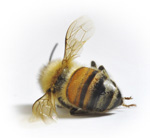Washington, DC–(ENEWSPF)–March 18, 2013. The bee-killing neonicotinoid insecticides used for agriculture will continue to be used across the European Union (EU), as members failed to reach an agreement on the proposal to suspend their use on flowering crops over the next two years. The proposal had followed reports released by the European Food Safety Authority (EFSA), which found the continued use of neonicotinoids to be an unacceptable “high acute risk” to pollinators, particularly honey bees. However, three EU members opposed the plan to suspend, blocking the European Commission from attaining a qualified majority to adopt the proposed suspension.
“The commission put the text to the vote and no qualified majority was reached, either in favor or against the text,” the European Commission said in a statement.
Those opposing the proposal, notably UK and German Ministers, argued that more scientific evidence was needed as a suspension could cause disproportionate damage to food production, counter to research indicating bee declines also damage crop productivity. Pesticide companies Bayer and Syngenta have pressed hard following the EFSA report to effect this outcome.
The decision, or lack thereof, runs contrary to a precautionary approach to ensuring healthy bees as critical for our food production system, as well as public understanding of the seriousness of the problem. According to YouGov poll released Wednesday by the Avaaz network, 71% of people in the UK supported the proposal for restriction on neonicotinoid pesticides, with an additional 2.5 million signatures backing the proposed ban.
France, Germany, Italy and Slovenia have all instituted bans on the neonicotinoid pesticides, including clothianidin, imidacloprid, and thiamethoxam. However, the EC proposal would have extended ban across all 27 member states.
With one in three bites of food reliant on bees and other insects for pollination, the decline of honey bees due to pesticides, disease, pathogens, and a synergistic effect of other variables has prompted action from organizations around the world. Indeed, an abundance of scientific research has been released within the last year which convincingly link neonicotinoids to declines in honey bee health, honeybee deaths, and increases in bee disappearance during foraging.
The EC proposal would have suspended the use of three neonicotinoids from use on flowering crops like corn, oil seed rape, apples, carrots, strawberries, for a period of two years, with requirement to additional subsequent review.
Join us April 5-6, for Beyond Pesticides’ 31st National Pesticide Forum, where New Mexico honey bee inspector, president of the New Mexico Beekeepers Association, and a beekeeper for over 30 years, Les Crowder, will discuss organic and natural solutions in beekeeping for problems commonly treated with chemicals, and the role beekeepers play in protecting biodiversity. Organic agriculture, beekeeping, resilient food systems, pesticides and much more will be discussed. Space is limited so register now.
Sources: The Guardian, http://www.beyondpesticides.org
All unattributed positions and opinions in this piece are those of Beyond Pesticides.








